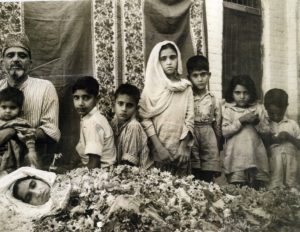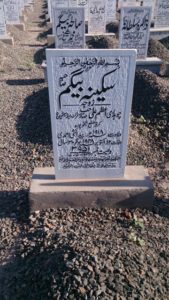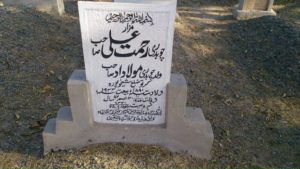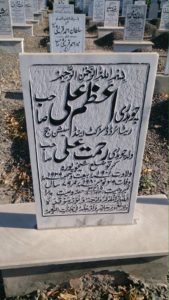Azam Ali, an Ahmadi Moslem
Chapter 03 – Coach
Reap what you sow
Abba Ji had a unique way of instructing – teaching, tutoring and training. He used to ask lots of questions, all sorts of questions, of us brothers and sisters, while we were growing up, even when we were grown up.
I was quite young when walking out in the fields one day he pointed to a standing crop. He explained that some farmer had ploughed the land and sowed the seed (paddy) for rice. He would watch it for months, look after it as much as he could, and then would harvest it.
Then he asked, “What will be the crop if the seed was wheat?”
After my answer, he asked, “Can the seed of rice grow the crop of wheat?”
After my answer, he asked, “Can the seed of wheat grow the crop of rice?”
After all that and back home, I shared my ‘discovery’ with my siblings who except my older half-sister were younger than me. No wonder a kid through such a drill cannot easily forget that You Reap What You Sow.
Abba Ji lived the life of a Moslem. Out of the home he was a lawyer and a judge who stated things very clearly and succinctly. Inside the home he was a father as well who guided and determined the future of at one time ten children of whom seven grew up to be grandparents.
His walks and talks reflected all the values and virtues that he believed, professed and practiced. His conversations referred abundantly to his village life where he grew up and to his family roots. He stated his personal experiences endowed richly with rainbow colors of wisdom and knowledge. He interspersed his talk and life experiences with such frequent repetitions that we all knew them. He followed the same regime asking questions at home with kids and outside with whoso he dealt. He impressed his audience by telling stories and elaborating results from which they learnt easily. He taught everyone who came close to him and all my life I watched him how he made his point. He started invariably by outlining his plan and making every effort to accomplish what his plan was. He repeated his pinpointed goal and kept asking questions so that his listener in effect learnt twice. He asked his addressee about his goal and helped him to zero in on a way to reach those goals. He swiftly moved to the implementation stage after he had guided the forming of the desired goal. He repeated the same process in every situation and his listener learnt lessons without being taught.
Encouraged Effort
Sometime in 1948 he had a refugee visitor who complained of joblessness due to the Indo-Pak Partition. After his usual discussion of fixing a goal and selecting a road to reach it he called me, then his 12-year-old son. He introduced me to the visitor and asked me to recite a poem which at that time was a favorite of Father and me. Now I don’t remember the whole Urdu poem but recall the lines with which each verse ended as follows. Ooth baand kamar keya darta hai i.e. Get up. Be ready. What is there to fear. Phir daikh khuda kiya karta hai. i.e. Then see how God makes thing appear. The visitor acted upon the plan, found a job he was happy to do, and became a life-long friend.
Teaching children
In October 1948 my mother passed away. Then on our father had also to be the mother of us all seven from 1-year-old to 13-years-old children (See Tr – Azam Ali, an Ahmadi Moslem, Ch – 11 – Knowledge)
 Abba Ji had lined up all seven of us (Khalida in his lap, me Abid, Hamid, Sajda, Majid, Qanta and Sadiq) beside our mother Sakina Begum who passed away on October 12, 1948, in Campbellpore.
Abba Ji had lined up all seven of us (Khalida in his lap, me Abid, Hamid, Sajda, Majid, Qanta and Sadiq) beside our mother Sakina Begum who passed away on October 12, 1948, in Campbellpore.
Father intended to make us his kids physically strong, spiritually sound and morally solid. All his input was focused on producing those results. He used to pick one of the daily activities. Then he microscopically examined and thoroughly explained numerous aspects of that activity. Then he told of a story of someone who resolved to excel in that activity and had reached its top. Then he talked of an appropriate prayer that had or could have helped him in reaching that goal. Then he discussed additional benefits of that prayer and improvements in other fields as well. He used to tell us of the prayer first and then instructed us to repeat it after him word by word. He passed us through these introductory stages just like a classroom discipline and atmosphere. He urged us to memorize each prayer, write it down if necessary and start using it continually. He recited those words in the daily prayers, often loud for us to hear him and correct ourselves. He intended all those prayers to settle down deep in our minds and take roots for permanent use. He gathered us all children almost daily in a classroom scenario and asked us about the prayers. Those who failed to give the right answers suffered the effect of the cause of failing homework.
Father’s ways were that I followed since most children do what they see their parents do. He continually led us to memorize, internalize and utilize the prayers. The process to learn them at that time was easy as all it required was to narrate them if asked to. Over eighty years later now I am amazed at the lasting nature of his input and things he taught us. I still remember some of the occasions when we were taught or tested for a prayer or lesson. I need no effort in recalling a prayer which is most suitable for any good or sad occasion I face.
Our oldest sister’s son Dr Zarar Bajwa has often remarked: “The prayers Nana Abu (maternal grandfather) taught us after the Fajr (the morning) prayers when he visited us are hard to forget.” That is how Abba Ji is remembered by those of his third generation who had the good fortune to have benefitted by his love while also teaching, training and tutoring them imperceptibly.
Coach
Abba Ji was my guide and mentor. What I saw him do was that I subconsciously learnt to do as well. His way of forming an intent, setting up a plan, and right away start implementing the plan I copied. His ways of logic, reasoning and presentation I emulated in my talks, speeches and argumentation. His instructive teaching style in my speeches, advocacy and delivery of messages benefitted me well.
The onlookers in the fields of law and religion told me all my life that hearing and seeing me render some service, deliver a sermon in a mosque, or argue a case in a Court room made them feel as if they were hearing my father. I laid emphasis and fluctuated my tones in public speeches like that of my father. Even when I took a position that would have been 180 degrees opposite his way or view, my manner and method of expressing myself was that of Abba Ji. After all, Every Action Has An Opposite Reaction must also come into play sometime.
In 1959-60, Mr. Justice Orthicon heard me argue before him my first case ever in Lahore High Court. After I had left his court room, he openly made some complimentary remarks about my argumentation. Present in the court room was Chaudhry Mohammed Anwar Buttar Advocate who pointed out to the Judge that I was his colleague Chaudhry Azam Ali’ son. “How unlike his father!” the Judge remarked. Apparently, he knew my father well and had high regards for his services in the Judiciary. He was happy to know that I was his colleague’s son who did the job well in his court. What the Judge appreciated was my presentation of the facts and preparation for my case even as I impugned the judgment of a lower court like that of my father.
Father is not with us today, but those prayers are and will benefit us forever. The prayers were an immensely rich treasure he laboriously instilled in us, and we conveniently accumulated.
Father in the spring of 1957 was in Montgomery, later called Sahiwal. He was there as the District and Sessions Judge to try a couple of murder trials and stay at the Government Rest House. I had come from the law school boarding house to stay with him for 2 weeks to prepare for my finals by pulling myself away from other activities.
One evening when returning from the mosque after the Mughrib (early evening) prayers we were walking together when in a rare show of emotion and affection he suddenly held my upper left arm and started, “Son, soon you will be a full-fledged lawyer and take the lead of your pack (meaning my siblings) from us older people.”
He talked for the next several minutes. I don’t recall what he said since I was lost in a rare outburst of his emotions which sort of lifted me up to cloud 9. Until suddenly I was shaken awake as if from a trance with the loud clicks of heavy boots of the Police Guard who came to the position of Attention to greet Father’s return to the Rest House.
Today I can’t recall what specific prayer he had discussed on that occasion. But thinking back on our walk I am almost sure that he wanted me to understand the real impact of the prayer which Abraham had offered for his progeny, parents and people around him.
Rub-bay ij-ul nee mo-qee-ma us-sa-laa-tay wa min zoor-ree-ya tee Rub-ba naa wa ta-qub-bul do-aa-aa Rub-ba naugh-fir lee wa lay waa-lay-duy ya Wa lay il-mo-may-ne-na yao-ma ya-qoo-mo ol-hay-saab. سُوۡرَةُ إبراهیم – Ch: 014, Verse 041 & 042
God, please make me and my progeny regular in prayers. God of us all, please accept (this) prayer. God of us all, please forgive me, my parents And the believers the day Accounting takes place. 014:041 & 014:042
Tough act
Abba Ji, his parents, and parents of our mother prayed for us all the time. I think all parents do that. But our parents also established in us the belief that we were the conduits who must pass their prayers on to our next generation, and further had the duty to inculcate in them the determination to be the conduits to pass on to their children, and that the process must go on and on.
Today as a grandparent myself I wish I could pass even a millionth of the quantity or quality of those prayers or their results for my successors who nevertheless have a tremendous treasure of prayers coming down in pike to them from their ancestors.




 Abba Ji had lined up all seven of us (Khalida in his lap, me Abid, Hamid, Sajda, Majid, Qanta and Sadiq) beside our mother Sakina Begum who passed away on October 12, 1948, in Campbellpore.
Abba Ji had lined up all seven of us (Khalida in his lap, me Abid, Hamid, Sajda, Majid, Qanta and Sadiq) beside our mother Sakina Begum who passed away on October 12, 1948, in Campbellpore.
004:002
The Holy Qor-aan 004:002
يٰۤـاَيُّهَا النَّاسُ اتَّقُوۡا رَبَّكُمُ الَّذِىۡ خَلَقَكُمۡ مِّنۡ نَّفۡسٍ وَّاحِدَةٍ وَّخَلَقَ مِنۡهَا زَوۡجَهَا وَبَثَّ مِنۡهُمَا رِجَالًا كَثِيۡرًا وَّنِسَآءً ۚ وَاتَّقُوا اللّٰهَ الَّذِىۡ تَسَآءَلُوۡنَ بِهٖ وَالۡاَرۡحَامَ ؕ اِنَّ اللّٰهَ كَانَ عَلَيۡكُمۡ رَقِيۡبًا
Yaa-auy-yo-hun-naa-soot-to-qoo-rub-ba-ko-mool-la-ze Kha-la-qa-koom-min-nuf-sin-wa-hay-da-tin Wa-kha-la-qa-min-haa-zao-ja-haa Wa-buth-tha-min-ho-maa Ray-jaa-lun-ka-thee-run-wa-nay-saa-aa Wut-ta-qool-laa-hul-la-ze Ta-saa-aa-loo-na-bay-he-wul-ur-haa-ma In-nul-laa-ha-kaa-na-alai-koom-ra-qee-baa
Listen, you all people! Love your God Who Created you from one person And He created from it its mate And spread from them both Many men and women. And you should love Allah with Whom, And the relationships, you ask for favors Surely Allah has always been a Watch over you.
The Holy Qor-aan has used the Phrase Wut-ta-qool-laa-ha ... in many contexts
* 004:002a. One aspect of the Creation of mankind is described in this verse and others including the verse 002:031.
** 004:002b. The word ٱلۡأَرۡحَامِ (ur-haa-may, a noun in the plural) literally means wombs which are a body part of female vertebrae. Wombs are where a fetus develops and grows into a living being both in humans and animals. Among mankind the word refers to the relationships which rise with reference to the wombs. People when in need rekindle their ties connected thru mothers who gave birth to the siblings. Blood is thicker than water perhaps arose from efforts seeking respect for such connections. This verse highlights the Rule of Universal Application that most people recognize anyway. Various translators have expressed this phenomenon in their own words and as follows..